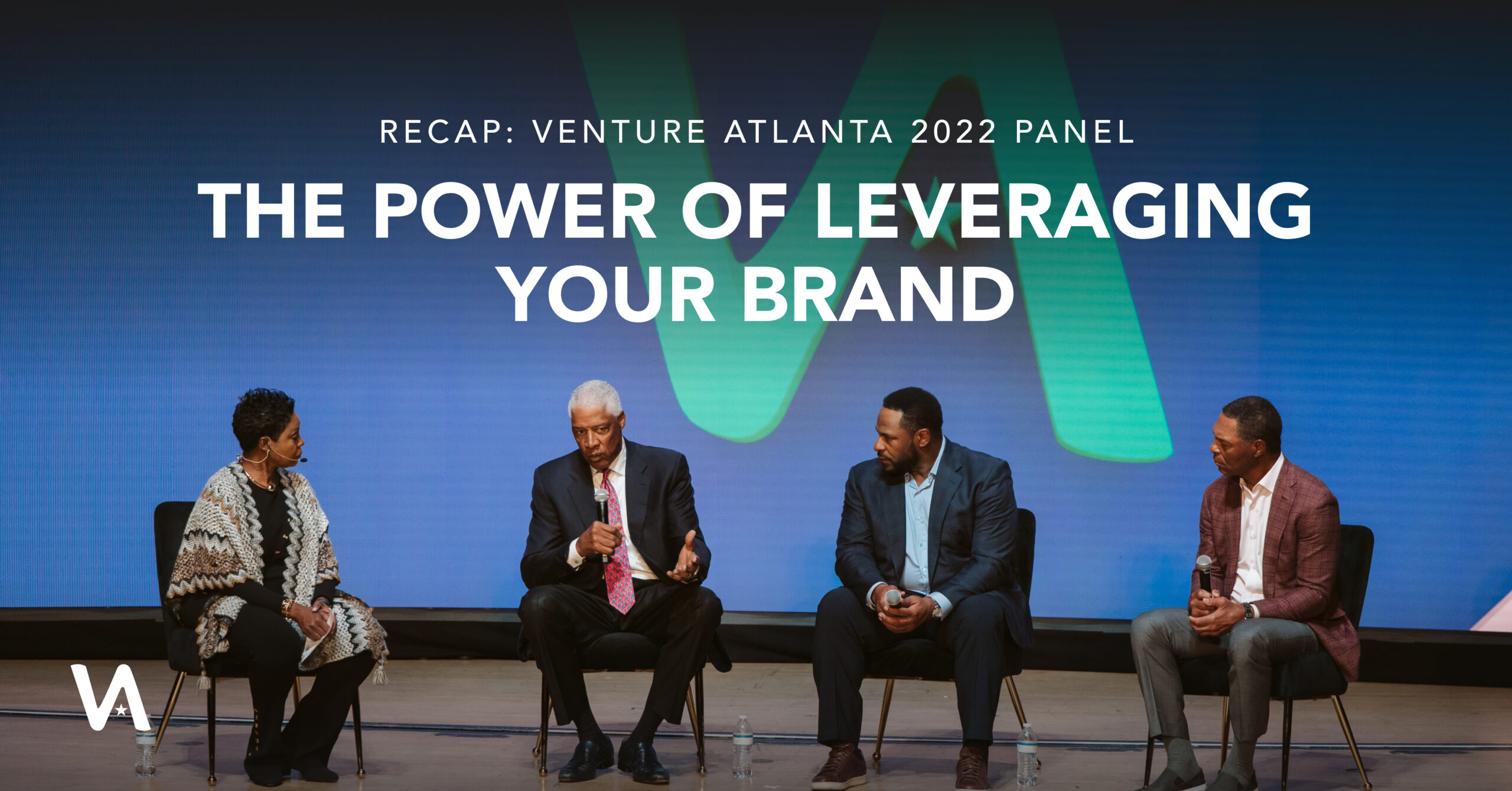The closing panel of Venture Atlanta 2022 was definitely the most anticipated of the conference. On stage in front of a packed Atlanta Symphony Hall, three sports legends joined Atlanta serial entrepreneur Phyllis Newhouse (CEO of Xtreme Solutions) to discuss the influencer economy and how personal branding is crucial for success and generational wealth. In Venture Atlanta’s Hall of Fame panel, NBA all-timer Julius "Dr. J" Erving and NFL hall-of-famers Jerome Bettis and Marcus Allen shared their personal experiences, values, and personal branding examples that helped each of them shape their careers and build a lasting legacy.
The conversation was candid, inspiring, and at times, hilarious. You can watch the full panel here:
Below are some key takeaways from the discussion.
The Hall of Fame of Values: Consistency, Personality, and Giving Back
When asked about each of their individual “value cards,” the athletes shared what they brought to their teams and carried with them throughout their careers.
Dr. J, one of the most influential and iconic basketball players in the history of the sport, shared that his value card was consistency. He aimed to be a consistent team player and captain, showing up every night to do his best. He operated under the assumption that not every game would be one for the record books, but as long as he could consistently produce, he was playing his role well.
Jerome Bettis, the hall-of-fame Rams and Steelers power running back, said his value card was his personality. He’s always been able to draw people in with his humor and make them feel at ease. "My teammates were drawn in. When I’m able to interact with people and they get to meet me, I love to laugh and joke. As a result, people become disarmed pretty quickly," Bettis said. He credits this strength of his as a driving force of his success, both in football and beyond.
Another hall-of-fame running back in Marcus Allen, who played for the Raiders and the Chiefs in a 16-year NFL career, shared that his value card has always been his love for other people. He started by speaking to the idea of a self-premium that he always put on himself. He knew his worth, but he always valued others and used his platform to give back to his community. "I put a premium on myself, but I love people just as much as I love myself. I’m fortunate that I’ve always been able to give back. Lots of times in sports, you’re being replaced. If you’re a good person, you’ll give that next guy, the replacement, the knowledge they need to succeed. That was always one of my value cards," Allen said.
The Importance of Role Models
All three athletes talked about the role models who inspired them in their journeys. Dr. J listed some of his basketball heroes, including Wilt Chamberlain and Bill Russell, as well as entertainers like Grover Washington Jr. and Bill Cosby.
Jerome Bettis credited his father for modeling hard work and giving him a moral compass. "He was the person I emulated growing up," Bettis said. He also mentioned watching Walter Payton play football and being impressed by his mental toughness. "As a football player, I got to watch Walter Payton from afar when he played the Lions. He wasn't the strongest or fastest, but he had a mental toughness that no one could break. That’s something I added to my game," Bettis said.
For Marcus Allen, his father and coaches were significant influences, and he looked up to Muhammad Ali and Dr. J for their intellect, courage, and grace. "Dr. J has always been someone I’ve looked up to. The intellect, the courage and the grace. Muhammad Ali was someone I always looked up to and the only person I ever really got an autograph from. He and Doc are very alike. I always wanted to be great. But even more, I always wanted to make my parents proud," Allen said.
How to Invest in the Future
The athletes also discussed the importance of investing in the future, both financially and through education. Marcus Allen said he wished he had taken more business courses earlier in his career. He stressed the value of engaging with people and leaving a positive impact on every job, no matter how small.
As we now find ourselves fully entrenched in the influencer economy, Jerome Bettis advised being mindful of social media and how it affects one's personal branding. He emphasized the importance of staying authentic and consistent with who one is as a person. "Be mindful of these things that are very prevalent and weren’t years ago. Be conscious of what you present to the public. Social media doesn’t take a day off. Everything you present is telling a story. If that story is inconsistent with who you are, you’re not being authentic."
Dr. J, who has had major success as a pitchman for various products and companies, shared his approach to building wealth. He emphasized the importance of taking equity instead of cash and investing in companies that align with one's personal values. "To do that early enough would be a big differentiator for me," Dr. J said.
Building Your Brand in the Influencer Economy
The panel discussion was particularly relevant in the context of the influencer economy, where personal branding and social media presence are essential for success. The athletes' stories offer valuable insights for aspiring influencers, entrepreneurs, and anyone interested in building their brand and legacy. Their experiences and personal branding examples offer inspiration and guidance for anyone seeking success and generational wealth.
As social media and personal branding continue to shape the influencer economy, it is essential to build a brand that is consistent with who you are as a person. By being true to yourself and staying authentic, you can build a brand that lasts a lifetime and leaves a positive impact on the world. And, as the athletes on the panel demonstrated, investing in your education, values, and future can help you achieve success, create generational wealth, and truly help you make your dreams come true.
FAQ
How big is the influencer economy?
The influencer economy is estimated to be worth billions of dollars globally, and its growth shows no signs of slowing down. According to a report by Influencer Marketing Hub, the influencer marketing industry reached $16.4B in 2022.
Do influencers contribute to the economy?
Influencers contribute significantly to the economy. Through partnerships with brands, influencers create content that promotes products and services, which generates sales and revenue. Additionally, influencer marketing has become an industry in itself, providing jobs for creators, marketers, and other professionals.
Is the influencer economy sustainable?
The long-term sustainability of the influencer economy is uncertain, as it is heavily dependent on social media platforms and the changing preferences of consumers. However, as long as there is demand for social media content and consumer attention, there will likely be a place for influencers in the economy.
What is an example of personal branding?
Personal branding is creating a consistent and authentic image of yourself across multiple channels, such as social media, blogs, and personal websites. This can include using a distinct color scheme, typography, and messaging to convey your values, personality, and professional expertise. Personal branding may also be exemplified in the types of industries an individual chooses to associate with. A strong personal brand can help you stand out in a competitive market and attract new opportunities.
How do you find your target market?
To find your target market, start by identifying the people who are most likely to benefit from your product or service. Consider factors such as age, gender, location, income, interests, and purchasing habits. Conducting market research, analyzing customer data, and testing your product with a small group of potential customers can also help you understand your target market and refine your messaging and branding to appeal to them. Additionally, social media platforms offer various tools to target specific demographics, behaviors, and interests, which can help you reach your ideal customers.


